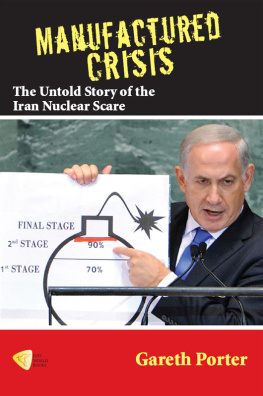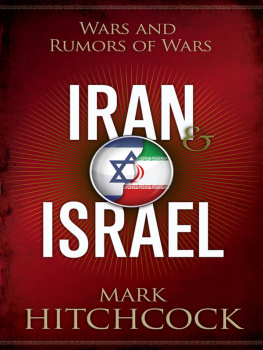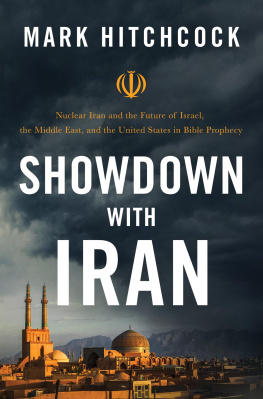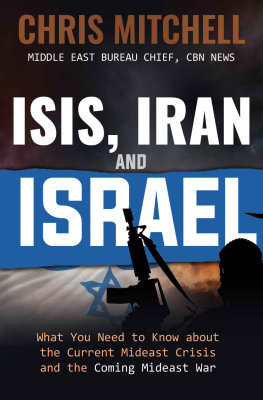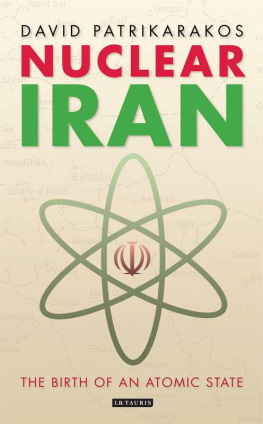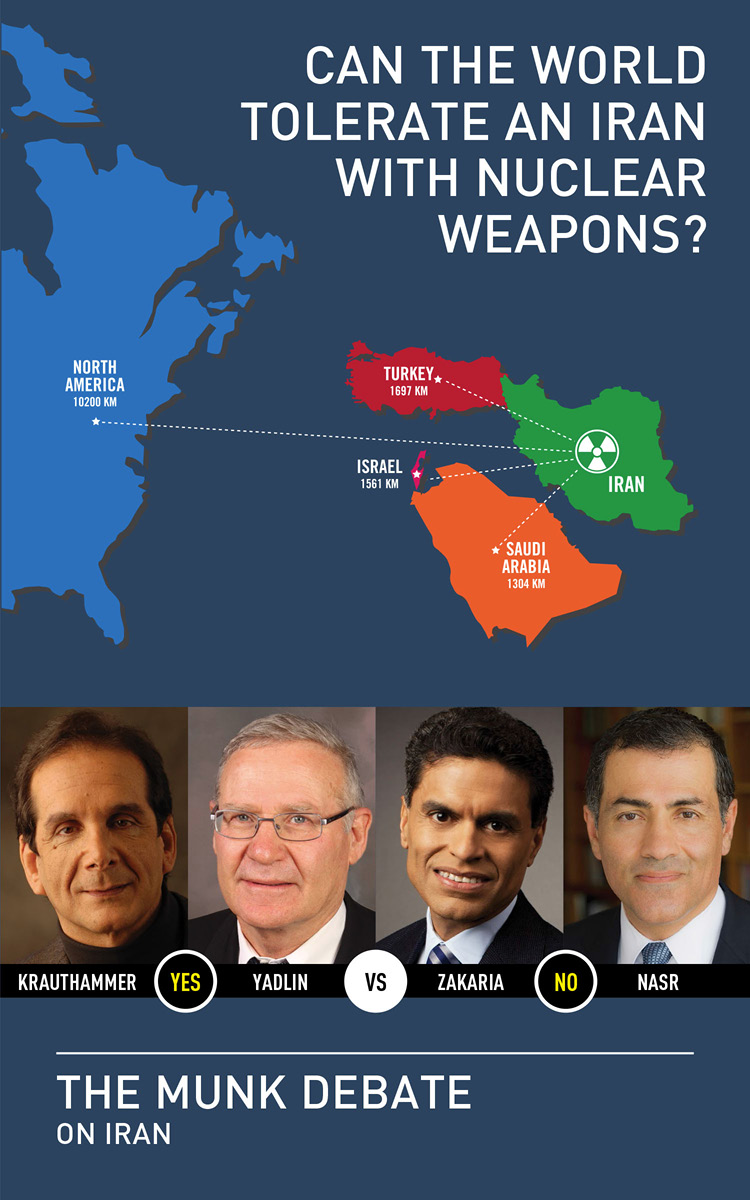CAN THE WORLD
TOLERATE AN IRAN
WITH NUCLEAR
WEAPONS?
KRAUTHAMMER AND YADLIN
VS. ZAKARIA AND NASR
THE MUNK DEBATE ON IRAN
Edited by Rudyard Griffiths

Copyright 2013 Aurea Foundation
Charles Krauthammer in Conversation, by Hannah Sung. Copyright 2012, Globe and Mail
Vali Nasr in Conversation, by Hannah Sung. Copyright 2012, Globe and Mail
All rights reserved. No part of this publication may be reproduced or transmitted in any form or by any means, electronic or mechanical, including photocopying, recording, or any information storage and retrieval system, without permission in writing from the publisher.
Distribution of this electronic edition via the Internet or any other means without the permission of the publisher is illegal. Please do not participate in electronic piracy of copyrighted material; purchase only authorized electronic editions. We appreciate your support of the authors rights.
This edition published in 2013 by
House o f Anansi Press Inc.
110 Spadina Avenue, Suite 801
Toronto, ON, M5V 2K4
Tel. 416-363-4343
Fax 416-363-1017
www.houseofanansi.com
The transcript o f this debate seeks to be as close to a verbatim account o f its proceedings as possible. Every reasonable effort has been made to verify the accuracy o f the facts and statistics presented in this debate.
Library and Archives Canada Cataloguing in Publication
Can the world tolerate an Iran with nuclear weapons? : the Munk debate
on Iran / Amos Yadlin... [et al.] ; Rudyard
Griffiths, editor.
(The Munk debates)
Issued also in print format.
ISBN: 978-1-77089-237-8
1. Nuclear weapons Iran. 2. Iran Strategic aspects.
3. Iran Military policy. 4. Security, International.
I. Yadlin, Amos 1951
II. Griffiths, Rudyard III. Series: Munk debates
U264.5I7C36 2012 355.02170955 C2012-907357-1
Library o f Congress Control Number: 2012952631
Cover design: Alysia Shewchuk Transcription: Rondi Adamson
We acknowledge for their financial support o f our publishing program
the Canada Council for the Arts, the Ontario Arts Council, and the Government o f Canada through the Canada Book Fund.
FOREWORD BY PETER MUNK
Since we started the Munk Debates, my wife Melanie and I have been deeply gratified at how quickly they have captured the publics imagination. From the time o f our first event in May 2008, we have been able to host what I believe are some o f the most exciting public policy debates in Canada and internationally. Global in focus, the Munk Debates have tackled a range o f issues such as humanitarian intervention, the effectiveness o f foreign aid, the threat o f global warming, religions impact on geopolitics, the rise o f China, and the decline o f Europe. These compelling topics have served as the intellectual and ethical grist for some o f the worlds most important thinkers and doers from Henry Kissinger to Tony Blair to Christopher Hitchens to Paul Krugman to Lord Peter Mandelson to Fareed Zakaria.
Let me say a few words about why we started this program and why we believe so strongly that the Munk Debates originate out o f Toronto, Canada. As a Canadian who wasnt born in this country, a country that has accepted me with open arms and provided me with endless opportunities, I believe strongly that Canada must be a vital participant in world affairs. That was the primary reason that Melanie and I helped found the Munk School o f Global Affairs at the University o f Toronto, my alma mater. It was the same thinking that led my Aurea Foundation to launch the Munk Debates. We wanted to create a forum that attracts the best minds and debaters to address some o f the most important international issues o f our time, and make these debates available to the widest possible audience. And we wanted Toronto to be at the centre o f this international dialogue to affirm Canadas growing role as a world economic, intellectual, and moral leader.
Melanie and I are extremely gratified that the Munk Debates are making significant strides toward fulfilling the mission and spirit o f our philanthropy. The issues raised at the debates have not only fostered public awareness, they have helped all o f us become more involved and therefore less intimidated by the concept o f globalization. Its so easy to be inward-looking. Its so easy to be xenophobic. Its so easy to be nationalistic. The hard thing is to go into the unknown. Globalization, to many people, is an abstract concept at best. These debates are meant to encourage us to further engagement with the forces, good and bad, o f globalization and the ancillary geopolitical issues that define our era in human history. The purpose o f this debate series is to help people feel more familiar with our fast-changing world, and more comfortable participating in the global dialogue about the issues and events that will shape our collective future. It is essential today that we equip ourselves, and especially young people, with the skills and inclination to become vital and engaged participants in global affairs.
I dont need to tell you that there are many, many burning issues. Whether you talk about global warming or the plight o f extreme poverty, whether you talk about genocide or whether you talk about our shaky global financial order, there are many critical issues that matter to many people. And it seems to me, and to the Aurea Foundation board members, that the quality o f the public dialogue on these critical issues diminishes in direct proportion to the importance and the number o f these issues clamouring for our attention. By trying to highlight the most important issues at crucial moments in the global conversation, these debates not only profile the ideas and solutions o f some o f our brightest thinkers and doers, but crystallize public passion and knowledge, helping to tackle some global challenges confronting humankind. Just as important, they seek to make Canada the forum where Canadians and the international community can observe world-class thinkers engage each other on the big issues o f the day.
I learned in life and Im sure many o f you will share this view that challenges bring out the best in us. I hope youll also agree that the participants in these debates challenge not only each other, but they challenge us to think clearly and logically about important problems facing the world.
Peter Munk
Founder, the Aurea Foundation
Toronto, Ontario
INTRODUCTION BY RUDYARD GRIFFITHS
Great debates occur when you get the right speakers, talking about the right issues, at the right time. On all three counts our contest on Irans nuclear ambitions exceeded expectations. Arguing for the motion Be it resolved, the world cannot tolerate an Iran with nuclear weapons capability, was the formidable team o f Charles Krauthammer and Maj. Gen. (ret.) Amos Yadlin. Recently celebrated by the Financial Times as Americas most influential political commentator, Charles Krauthammer is renowned for his steely analysis and take-no-prisoners approach to public debate. He is the author o f a highly respected Washington Post column on U.S. domestic and international politics, which is syndicated in over 275 newspapers worldwide. He is also a contributing editor to The Weekly Standard and The New Republic , and a closely followed political commentator for Fox News in America.


